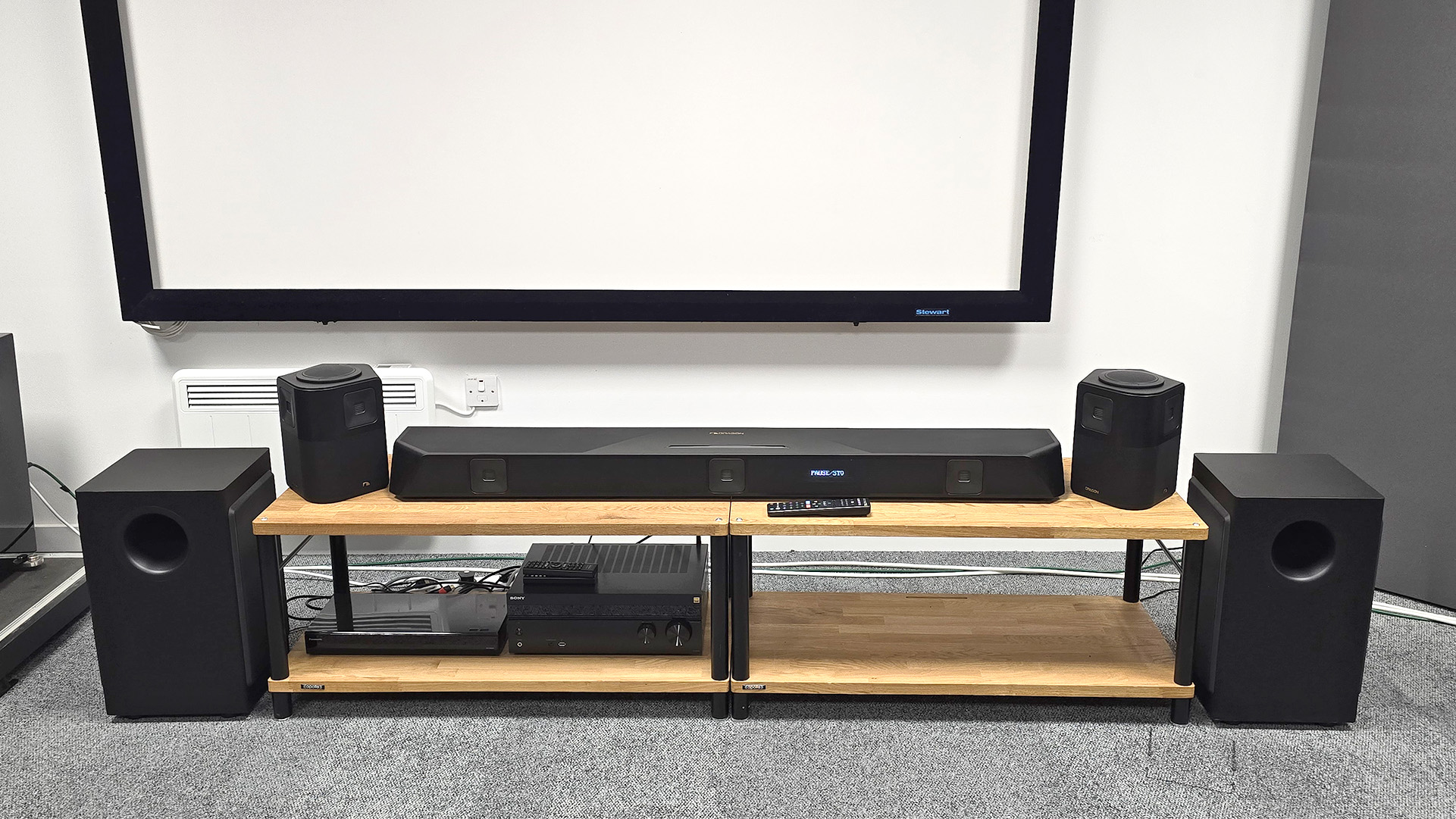
You may have heard of the Nakamichi Dragon before, but you might not remember it looking like this. Once the moniker of a legendary cassette deck and record player in the 1980s, a CD player in the 1990s, and even a Bluetooth speaker in the early 2010s, the Dragon name has adorned a veritable mishmash of audio gear in the last few decades.
Now the Nakamichi Dragon has been reinvented once again, this time for the 2020s, and it’s come back as a… Dolby Atmos soundbar package? It’s a left-field development in Nakamichi’s legacy, but we’re interested to see how it fares in our AV test room. Can this soundbar bring the heat, or will we have to slay this Dragon?
Price
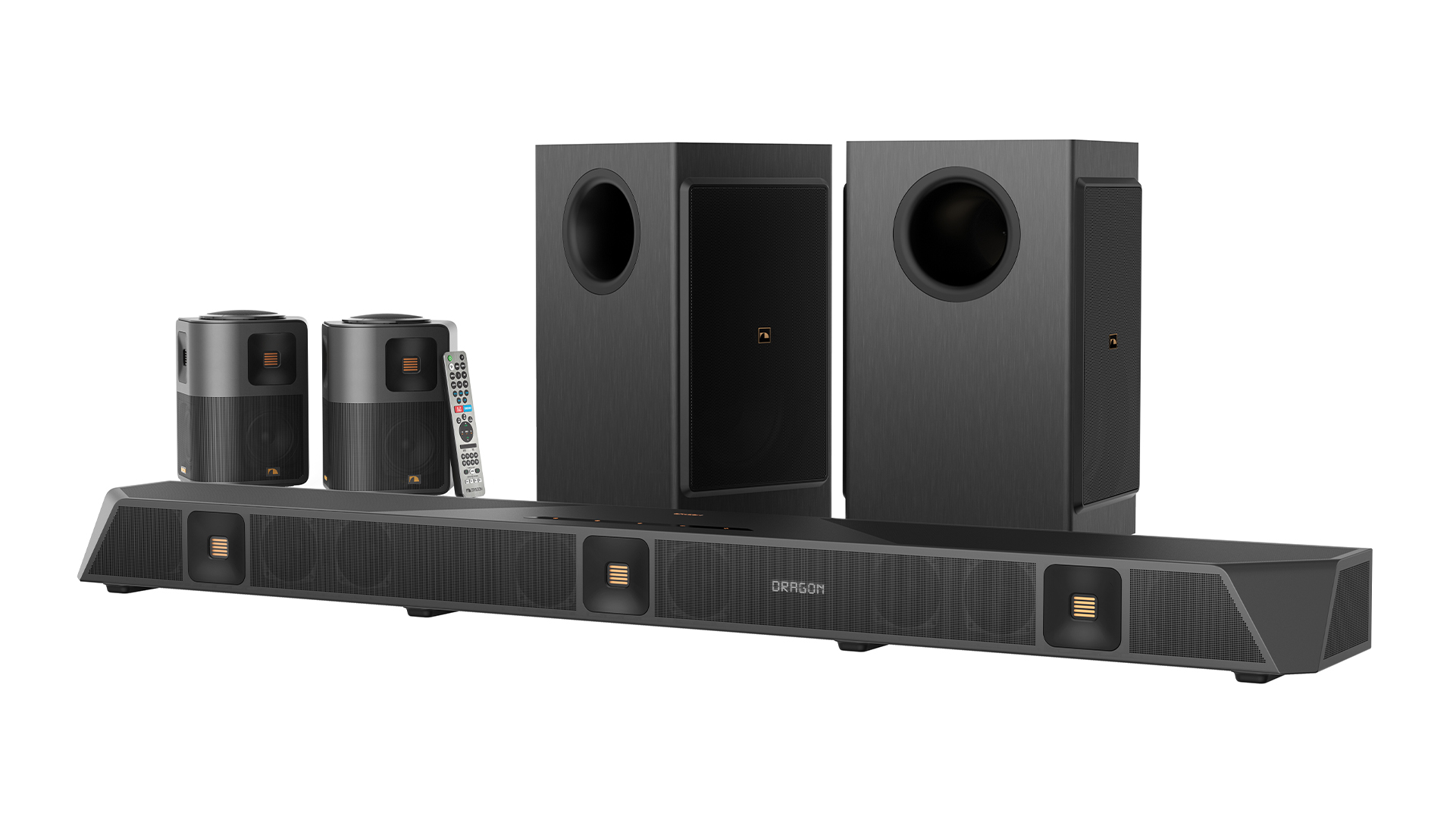
The Nakamichi Dragon 11.4.6 (to give it its full title) emerged from its lair at CES 2023, where the company announced it would be reviving the mythical beast. Up until very recently, Nakamichi only sold this soundbar system in the US, with outcry from many prospective customers worldwide.
That situation has now changed, thanks to Nakamichi striking a partnership with American online technology retailer B&H Photo Video, who will ship the bar overseas for customers in a wide selection of countries.
As standard the package costs $3900 (around £3200 / AU$6050), however, that price jumps up with tax and shipping costs if you want to get it sent across from the States. So, the total cost to buy the Nakamichi Dragon 11.4.6 and have it shipped to the UK is $5300 (around £4200), and for Australia, the total cost is $5050 (around AU$7600).
Spending well over a thousand pounds/dollars to get a soundbar shipped overseas may be a tough pill to swallow, and US customers will likely be relieved that they don't have to cough up any extra cash to have it delivered.
Build
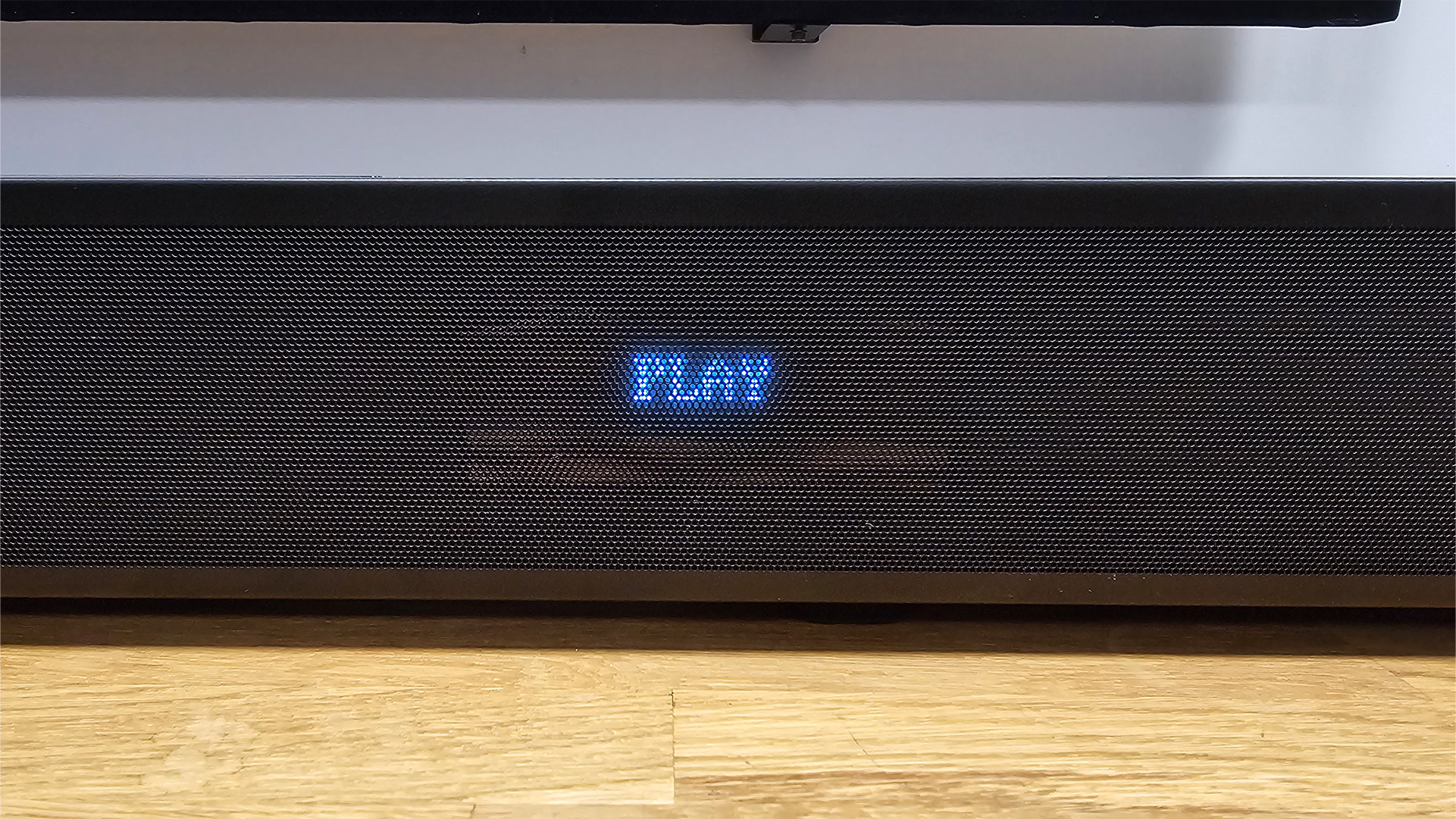
Lugging the Nakamichi Dragon into our test room is no small feat, and if you plan on buying one of these yourself, you will absolutely need someone to help you get it out of the box. The total weight of the system, box and all, is a staggering 67kg.
Starting with the heart of this system, the main soundbar unit, we’re first drawn to how absolutely huge it is. It measures 11 x 148 x 20cm (hwd) and weighs the best part of 15kg on its own, making it look rather out of proportion sitting below our 65-inch LG TV. We’d struggle to imagine it paired with any smaller TV either, so bear that in mind if you have a 55-inch set or smaller. Those with 75-inch TVs upwards may not be as concerned, although you are still going to need a hefty support to hold this bar.

Connectivity HDMI out (eARC), 3 x HDMI 2.1 in, optical, 3.5mm aux, Bluetooth 5.0
Format support Dolby Atmos, DTS:X Pro
Streaming N/A
Voice control N/A
Soundbar dimensions (hwd) 11 x 148 x 20cm
Soundbar weight 15kg
Surround speaker dimensions (hwd) 27 x 23 x 21cm
Surround speaker weight 4kg (each)
Subwoofer dimensions (hwd) 53 x 32 x 28cm
Subwoofer weight 16kg (each)
Thankfully, Nakamichi includes wall mounting brackets in the box if you plan on setting the bar up that way. Aesthetically, we find the main unit of the Dragon system to be divisive. While the steely grey colour pallet with occasional gold accents looks rather smart, we find the bulky build to be cumbersome, and the angled edges won’t be to everyone’s taste. Atop the soundbar, you’ll find a set of illuminated touch controls that are useful and responsive, and there is a reasonably sized integrated two-line dot matrix display on the front of the unit.
The surround speakers carry on the sizeable theme, dwarfing the petite surrounds of the soon-to-be-reviewed Yamaha True X soundbar package and even towering over the more conventionally sized surround speakers of the Samsung Q990C. The satellite speakers measure 27 x 23 x 21cm (hwd) and weigh 4kg each, and they too carry the dark grey and gold design of the main bar.
Interestingly, each unit features two drivers pointing in different directions so that they can serve as surround and surround-back speakers, and so they can be placed in different locations accordingly. There is also an upward-firing driver on top that can be rotated to five pre-set positions to angle the overhead sound towards your seating position. Slightly disappointingly, neither speaker stands or wall mounts for these speakers are included in the box, though both are available as optional extras. Each speaker features an ‘L’ or an ‘R’ on the rear which signifies if it's a left or right surround channel.
Finally, we have not one but two subwoofers, which is a rarity for a soundbar speaker package. It should come as no surprise when we say that these subs are also much bigger than those of other such packages, measuring 53 x 32 x 28cm (hwd), and weighing 16kg per unit. The subwoofers feature a black wooden veneer that seems slightly at odds with the look of the rest of the system, but the mesh grilles on either side of the units look fairly stylish. You’ll also find a sizeable port on the front of the subwoofer, with a power switch and pairing button on the rear.
If we’re being brutally honest, we would like this package to feel a bit more premium, especially considering the price. Nakamichi claims the soundbar is constructed with stainless steel (and we don’t dispute that), but we find it feels a bit cheap to the touch. The surrounds are weighty but feel a bit plasticky, and the subwoofers are nothing special in terms of construction. It’s by no means terrible, but it could be better.
The remote feels solid thanks to its metal top plate, and it features backlit buttons, which is a real treat. However, we find it to be a bit busy, with an abundance of buttons that hint at a 'kitchen sink' approach. It is quite responsive and you can switch between it using Bluetooth and IR to interface with the soundbar, which is useful if you have a lot of conflicting signals around your home entertainment set-up.
Features
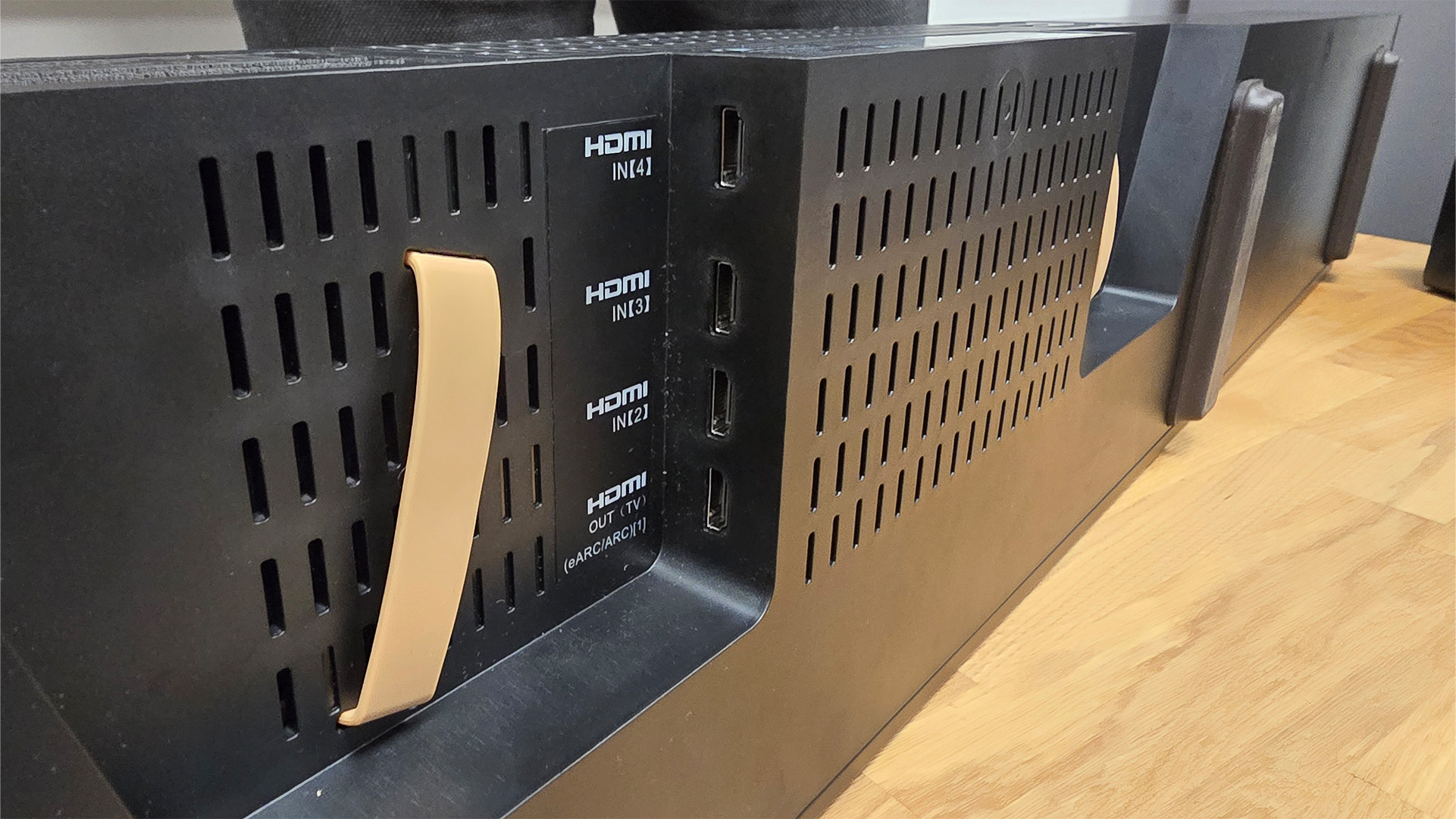
Strap in, this is a long one. Ultimately, Nakamichi is positioning this as offering the convenience of a soundbar system with the power, features and (most importantly) sound quality of an AVR and speaker package system. Therefore, it has loaded the Dragon with an absolute onslaught of features, and yet there are some very confusing omissions.
This is evident in the set-up process. Plugging the system in is where we come across our first hitch, as Nakamichi only provides leads with US plugs in the box – we know that’s not a deal breaker but it’s worth noting just in case you need to order some spare cables or adapters. Thankfully, when we do get the system powered up, all of the components immediately and seamlessly connect. This is a promising first sign, but it doesn’t tell the full story of the set-up process.
Nakamichi hasn’t included a microphone-assisted calibration system on the Dragon, which is rather puzzling. That means that we have to reach for our trusty tape measure in order to measure the speaker distances to the walls and listening position. While that in itself isn’t an issue – in fact, it’s likely to be a more accurate measure – we find the lack of mic-driven calibration to be a strange omission as it's a common feature of both soundbars and AVRs. On the subject of microphones, there isn't one built into any part of the system, including the remote, which means that the Dragon doesn’t feature support for Amazon Alexa or Google Assistant, which might be an issue for those who like to have their sound system integrated with their smart home.
The initial set-up of the system is made somewhat easier by a comprehensive on-screen display system. Nakamichi allows you to change sound levels for each channel, which is unusual in a soundbar system, and you can save your set-up presets too. Interestingly, Nakamichi includes a concierge service that you can contact via phone call, email or WhatsApp if you get stuck setting up the soundbar or need help with operation – although it’s only open from 10am to 6.45pm (4.45pm on weekends) Pacific Standard Time.
Connectivity on the Nakamichi is a tale of two halves. Wired connectivity is absolutely stellar, with inputs including HDMI eARC, optical and a 3.5mm jack. It features an impressive list of inputs, too, with three full-bandwidth HDMI 2.1 sockets that support 4K up to 120Hz, or 8K up to 60Hz, as well as VRR and ALLM. It also supports HDR10, HDR10+ and Dolby Vision HDR through those HDMI passthrough ports.
Wireless connectivity, on the other hand, is much less impressive. Nakamichi has opted not to include any sort of internet connectivity, which means no wi-fi streaming via Apple AirPlay, Spotify Connect, Tidal Connect or Google Chromecast. While we understand that you can stream tracks via your TV, media streamer or console, the simplicity of picking a track from your phone and beaming it to the bar would be more convenient. There is Bluetooth 5.0 connectivity, and it does support Qualcomm’s aptX HD codec, which is a nice touch, but you’re still stuck with compressed tracks over Bluetooth, especially from services such as Tidal. Much like the microphone-assisted set-up, most soundbars and AVRs we test offer support for wi-fi streaming, so it's another head-scratching omission.
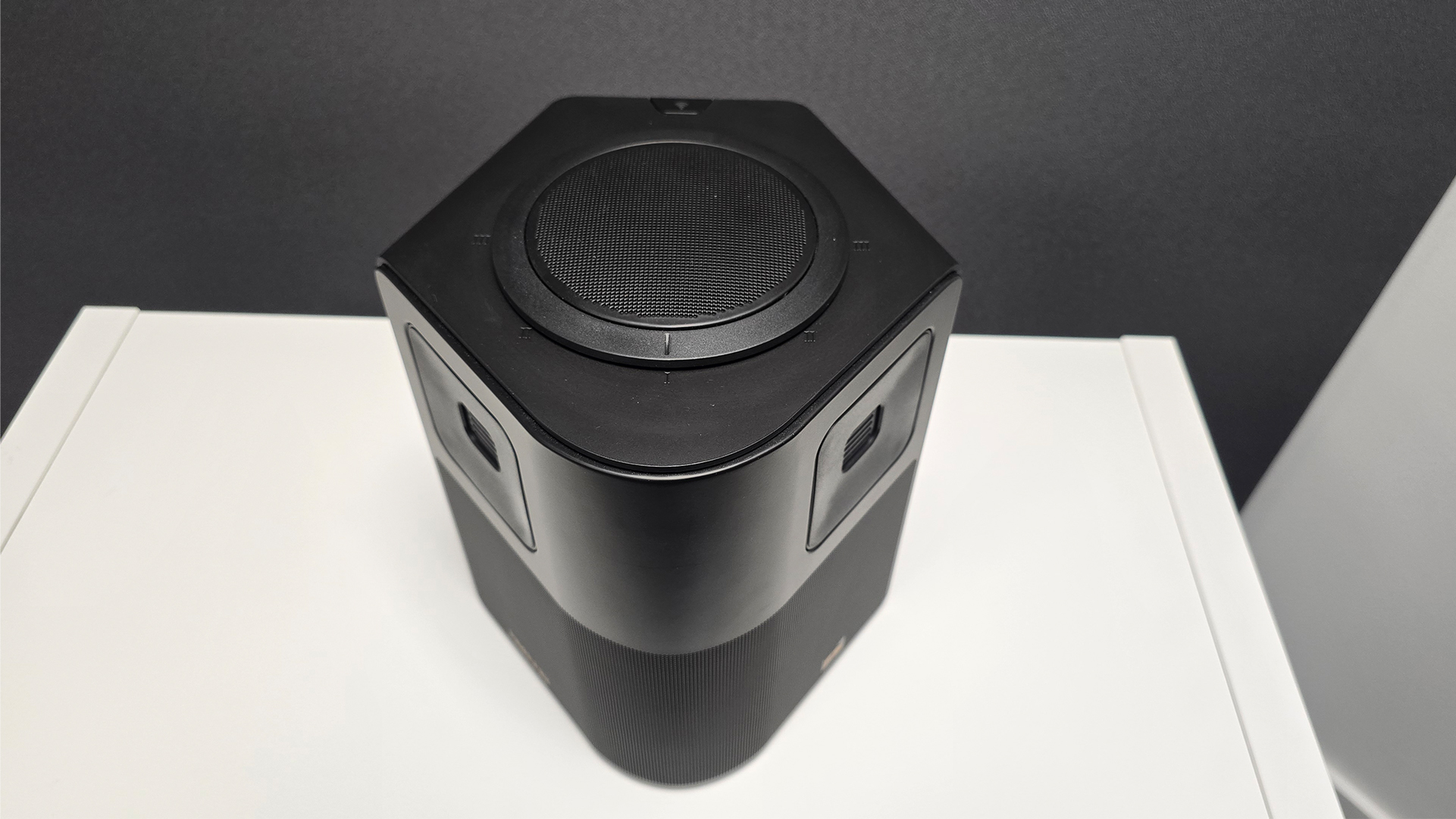
The Nakamichi Dragon has a borderline overwhelming number of sound features. It supports all Dolby formats, including Atmos, and it’s the first soundbar in the world to support DTS:X Pro. There are two options for each, with either Dolby Surround or native on the Dolby side, and DTS: Neural X or DTS Direct on the DTS side. Your selection here dictates whether the content you play is upmixed to all channels or directly decoded.
Alongside this is ‘studio mode’, which repurposes the side-firing drivers on the main unit into dedicated left and right channels. There is also the ability to set the Dragon to play in stereo using only the bar, or you can opt for ‘all channel stereo’, which combines the might of the surround channels and subwoofers to create a strange amalgamation of surround and stereo.
On top of that, there are a total of 14 EQ options. These include three music mode presets, three movie mode presets, presets for gaming, news and sport, four different intensities of night modes and a setting to turn off any Nakamichi equalisation. Layered on top of that once again is Nakamichi’s Adaptive Height Dispersion system, which uses sound processing to change the presentation of height channels.
There are four options to choose from: 'off' (as the director intended), 'focal' (optimised for a centre-focused three-dimensional soundstage), 'wide' (opens up the soundfield) and 'max' (maximises height effects regardless of the content). If our maths is correct that means that there are well over 2000 combinations between the various sound modes, EQ settings and Adaptive Height Dispersion – which feels overwhelming even to us, and we use complicated audio kit on a daily basis.
Nakamichi also features a set of QR codes in its manual that tells you the best settings for your HDMI sources to get the best sound. This exhaustive list includes practically everything: the Apple TV 4K, Panasonic Blu-ray players, PlayStation 5, Nintendo Switch, and Roku media streamers are all included and there are even American cable TV boxes. This is a genuinely handy guide to make sure your HDMI device is outputting sound correctly, and it's something other manufacturers could certainly learn from.
Last but certainly not least we get onto the speaker units, and there are a lot of them. Within the main unit, there are a staggering 17 speakers powered by seven digital amplifiers. That consists of ten 75mm drivers (forward- and side-firing), four 75mm angled upward-firing speakers and three 38mm air motion tweeters, which are a very rare find on a soundbar. Each subwoofer contains two 20cm woofer drivers (so other are four in total), and each satellite speaker has two 38mm air motion tweeters, two 9cm mid/bass drivers and one rotatable 75mm upward-firing speaker. That comes to a total of 31 individual speakers within this package. It’s also a powerful system, with a total claimed peak power output of 3000W – 1500W for the main soundbar unit, 250W per surround speaker and 500W per subwoofer.
Sound
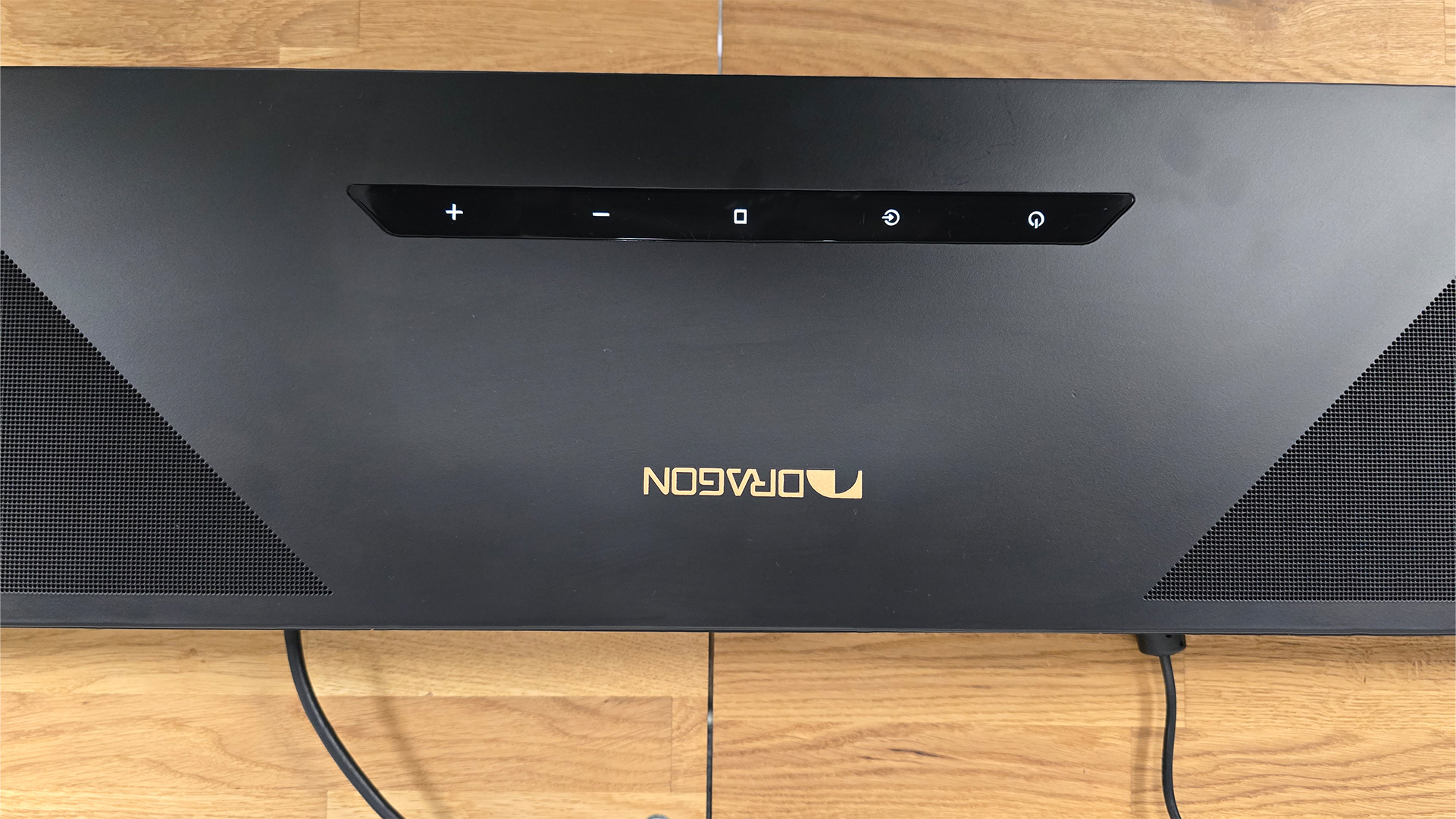
It’s all well and good cramming the Dragon soundbar with features, but audio performance is paramount. If there is one thing we can say about the Dragon, it is that its namesake is indicative of its performance, which is to say that it roars with very little subtlety. We pair the Nakamichi with a selection of test discs from our collection, including Oppenheimer, No Time To Die, Interstellar and The Batman. These films feature explosive action scenes, quieter moments of dialogue and plenty of opportunities for enthralling surround sound. We also flip through plenty of the sound settings to see how the bar performs.
The Dragon does a handful of things very admirably. Foremost is the clarity of its dialogue. Not once during testing do we find it difficult to understand dialogue, whether in a scene with two characters having a simple conversation or with dialogue spoken amidst lots of competing effects such as gunshots, car engines or loud cinematic scores. It also handles bass well, with a punchy, taut and controlled presentation giving a satisfying low-end kick to our cinematic scenes. While the option to turn the bass up is present, we find that in the more reserved numbers (bass level three at a push), the subwoofers deliver ample bass without sounding overbearing or mushy.
This soundbar package is also a dab hand at delivering surround sound effects. The sheer scale of this system means that you’re placed directly in the middle of the action, and that works a treat when it comes to scenes with effects that are designed to travel around you. The climactic cat-and-mouse game that plays out between Bond and a group of Land Rover and motorbike-riding baddies in a Norwegian forest is right at home on the Dragon. The effect of a grumbling, revving dirt bike travels naturally around us as we watch, making for a truly immersive and engaging experience.
However, it’s not all good news for the Nakamichi, as its fatal flaw prevents us from truly enjoying the sound it produces. No matter what we watch, in whichever setting, this soundbar system is overbearing and brash. It’s got a hard edge to its sound that deprives it of subtlety, and no matter how much we turn the volume down, it still sounds oppressive. Its big, shouty nature makes it unpleasant to listen to at times, and while we appreciate that it can go very loud, we’d trade sheer volume for a more enjoyable sound any day of the week.
It doesn’t present much character either, likely as a result of that lack of subtlety. We watch scenes with inspiring and energetic discourse, heartbreaking emotional pleas and outbursts of explosive rage in Oppenheimer, but it's rare that the Dragon will capture the intended emotion that the actors are trying to convey.
This is evident when we play music through it too. We use tracks by The XX, Taylor Swift and Hans Zimmer, and we find little enjoyment in listening to any of them. The sonic pitfalls we encountered with movies are also apparent here, and the all-channel stereo mode sounds disjointed and claustrophobic. Songs with lots of conflicting instruments and effects can also sound cluttered, which is something we also picked up during the Batmobile chase scene in The Batman.
Verdict
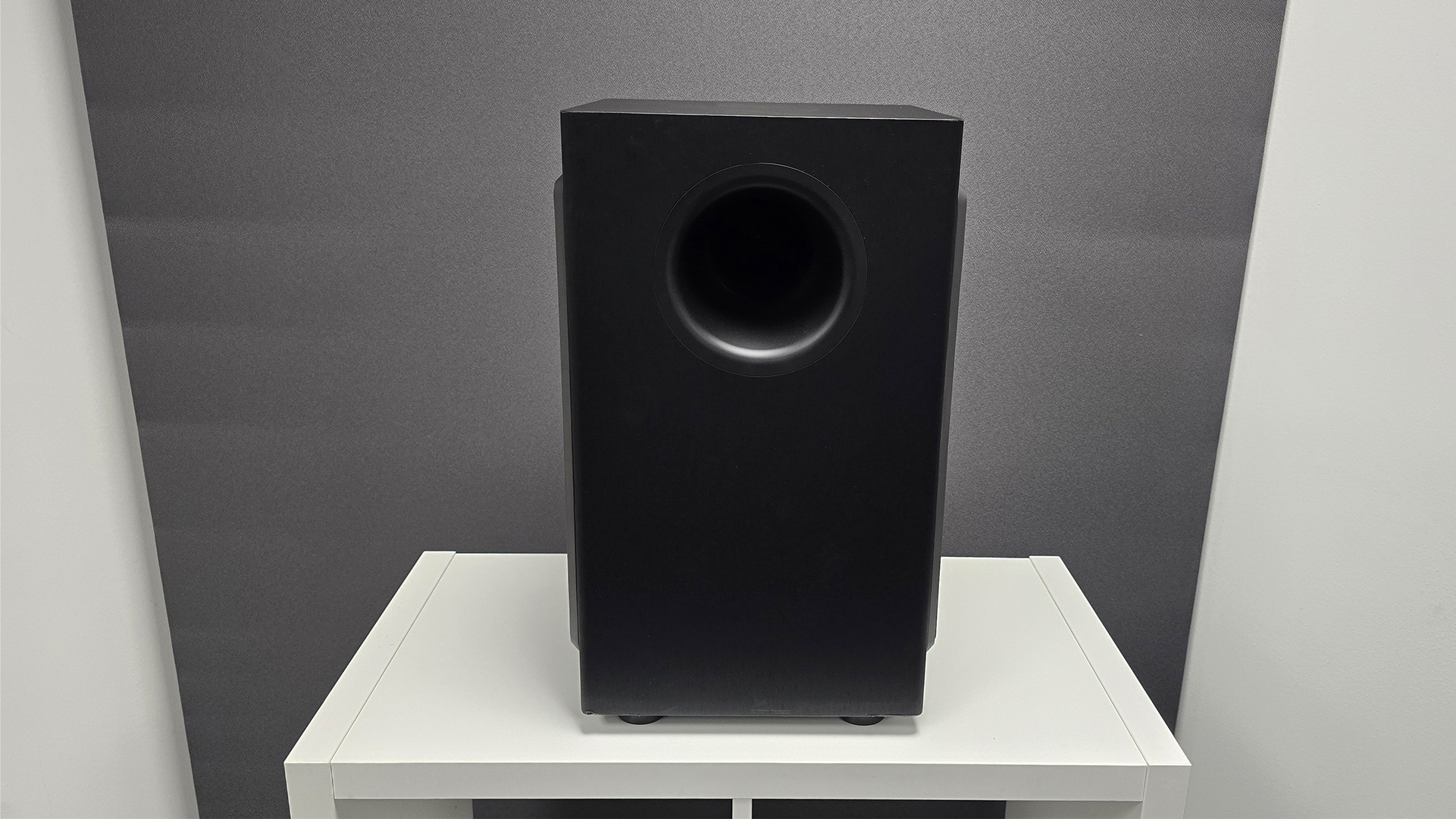
We don’t want to deter Nakamichi from trying new things, as there is a glimmer of a truly impressive product here. We cannot fault its determination to deliver a no-compromise alternative to an AVR and surround sound speaker package pairing, and we think that a few feature tweaks and paying closer attention to the sound characteristics of the Dragon could achieve this.
Unfortunately, the Dragon in its current state feels like a confused product. We find it too difficult to overlook the Dragon's hard, aggressive sound and lack of commonplace features, making it a tough system to recommend.
SCORES
- Sound 3
- Build 4
- Features 4
MORE:
Read our review of the Samsung Q990C
Also consider the Sony HT-A7000
Read our Sennheiser Ambeo Max review
Best soundbars: options for every budget, recommended by our experts







